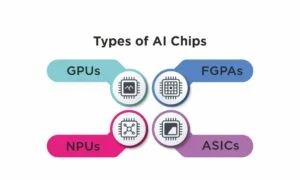Generative AI has become a tool for generating ideas and turning prompts into reality. It is no longer an emerging trend, rather a gateway to the tech revolution. Notably, cutting-edge performance, quick responses, ability to handle complex tasks, and reliability have been key factors in the increased adoption of generative AI across sectors.
But how do generative AI models achieve such significant capabilities? The secret is undoubtedly the state-of-the-art generative AI chips that enable firms to integrate AI models for smooth functioning. Such chips help establish a robust AI infrastructure while sustaining innovation and efficiency in AI models.
Let us find out what these AI chips are, how they work, their types, uses, and more in this blog…
What are Generative AI Chips?
Generative AI chips provide computational power to AI models for performing simple to complex tasks. These chips are the hardware support that enables the complex computational capabilities required for AI functions.
Unlike other computational chips, AI chips are chiefly designed to manage AI workloads, which include complicated math, reasoning, data analysis, coding, and others. Since AI models execute tasks beyond general-purpose computing, including multimodal capabilities such as text, images, and code, traditional CPUs often fail to meet the demand.
Additionally, AI models need continuous innovation as tasks get more complex. AI chips, in this regard, offer parallel processing, faster memory access, and innovation. NVIDIA, AMD, Intel, AWS, and Alphabet are among the leading generative AI chipmakers worldwide.
Types of AI Chips-
GPUs: Graphics Processing Units (GPUs) are designed to meet the demand for high graphics performance, such as in video games. Since generative AI involves sophisticated graphics generation, GPUs help achieve success in this process.
FGPAs: Field-Programmable Gate Arrays (FGPAs) are programmable generative AI chips purpose-built for specialized tools. These chips provide the ability for advanced customization via hardware reprogramming.
NPUs: Neural Processing Units (NPUs) handle large-scale data processing, neural networks, and deep learning, which are crucial to generative AI. Such chips further offer speed and efficiency while addressing multiple queries within an AI model.
ASICs: Similar to FPGAs, Application-Specific Integrated Circuits (ASICs) can be reprogrammed. With a singular purpose, these chips are often integrated to accelerate AI workloads.
How do AI Chips Work?
Generative AI chips use parallel processing to execute multiple tasks simultaneously. Generally, chips are integrated circuits composed of semiconductors and transistors. The process commences when an electrical current is transmitted via the circuit that turns it on and off. The digital device reads the signal accordingly as a one or a zero.
Since generative AI models require complex computational power, AI chips generate billions of signals per second. Such a procedure helps AI models handle diverse data types and perform complex tasks. Additionally, the transistors of AI chips are smaller but highly efficient, which enables quicker processing and leaves a considerably smaller energy footprint.
Apart from that, AI chips like NPUs include specialized cores for AI-centric calculations. Combining all these features, generative AI chips enable autonomous processing in AI models and offer real-time resolution to complex queries.
Importance of Effective AI Chips:
The demand for efficient AI models is increasing daily as companies across industries adopt AI to streamline their workflows. Alongside that, organizations are implementing AI models to perform complex tasks such as analyzing large datasets, coding, and reasoning. In such situations, models with efficient chips gain traction automatically.
Additionally, sophisticated AI chips enable better performance and speed within AI models. Here are the top benefits of integrating efficient generative AI chips-
Better Performance: AI chips are designed for specialized AI tasks. These are purpose-built, hence, can address critical tasks while maintaining consistency in performance. In short, the computational power of AI chips allows models to attain high precision and accuracy.
Enhanced Speed: AI models require faster computation and processing to handle diverse tasks simultaneously. For this purpose, AI chips enable parallel processing, which not only offers remarkable speed but also provides flexibility in AI models.
More Efficiency: The efficiency of AI models depends on how quickly they can process large amounts of data, maintain accuracy, and resolve queries. Sophisticated generative AI chips assist models in achieving higher efficiency, sustaining accuracy, and speed.
Use Cases of Generative AI Chips-
Generative AI chips can accelerate AI workloads in any area. Here are the major use cases-
Smart Devices:
Smart devices such as mobile phones, smart watches, smart TVs, etc. Integrates AI chips for voice recognition, predictive analytics, and multimedia processing. One example of a smart device with an AI chip is the Google Pixel 8 Pro. It is powered by the neural processing unit (NPU).
Autonomous Vehicles:
Autonomous vehicles like Tesla’s self-driving cars integrate sophisticated AI chips. These chips enable the collection and processing of large amounts of data and support real-time decision-making. The chip further adopts parallel processing to assess traffic signals and drive in a hassle-free way.
Robotics:
Robots have taken over many of our complex tasks across industries like healthcare and manufacturing. AI-enabled robots can execute complex tasks while improving performance. AI chips empower such robots with object recognition, human-robot interaction, and decision-making.
Cloud Computing and Edge Computing:
Cloud and edge computing services often utilize AI capabilities to store, manage, and process large datasets. AI chips allow smart data management opportunities with predictive analytics and lower latency. Moreover, AI chips enable edge devices to operate without an internet connection.
The Future of Generative AI with Sophisticated AI Chips!
The adoption of generative AI models is excelling every day, with almost 65% to 80% of organizations around the globe using them. Apart from that, the genAI industry was valued at $67 billion in 2024, which is set to surpass $967 billion by 2032. Such an adoption rate also seeks flawless performance and problem-solving capabilities within AI models.
Efficient generative AI chips not only help boost model performance but also offer enhanced computing power for smooth operations. Dive into YourTechDiet and explore the innovations that have been advancing diverse industries.
F&Qs:
1. What is the most powerful AI chip?
Ans. Google’s upcoming seventh-generation Tensor Processing Unit (TPU), also known as Ironwood, is considered to be the most powerful AI chip to date.
2. What kind of chips are used in AI?
Ans: Graphics Processing Units (GPUs), Neural Processing Units (NPUs), Application-Specific Integrated Circuits (ASICs), and Field-Programmable Gate Arrays (FPGAs) are a wide range of chips that are used in AI models.
3. Who is leading in AI chips?
Ans: NVIDIA is surely leading the AI chip industry, ahead of Intel, AMD, Microsoft, and Qualcomm, with 70% to 95% share in GPU manufacturing.
Recommended Read:
Exploring the Implications of Generative AI natural language processing for Marketers
What Are Some Ethical Considerations When Using Generative AI?
Are Generative AI Models Becoming Commodities or a Core Business Differentiator?


